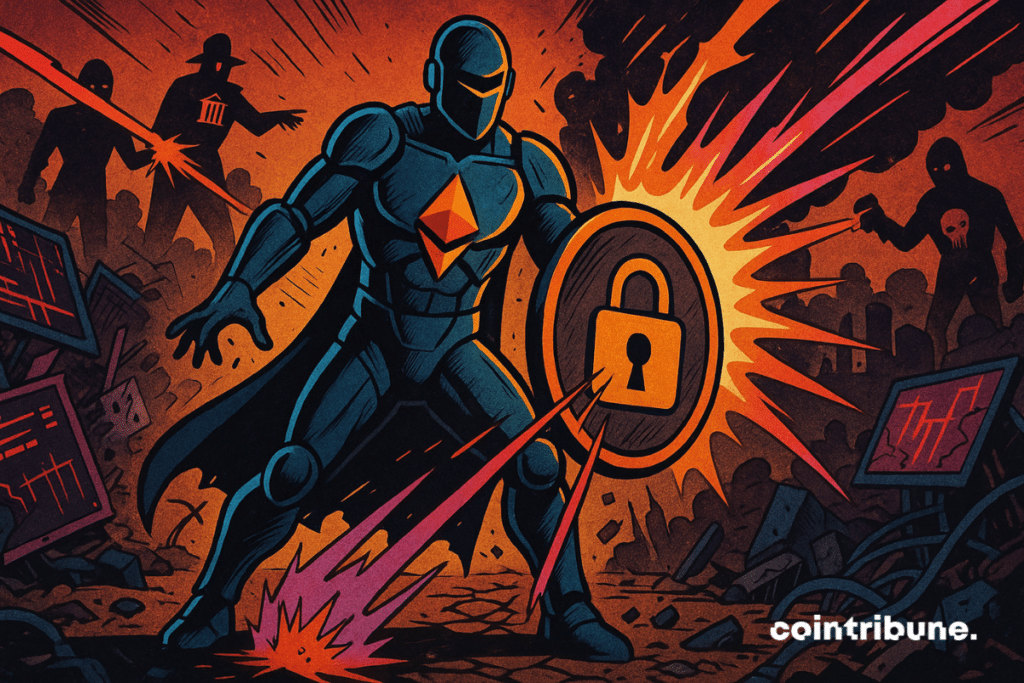Ethereum's Future Hinges on Resilience and Privacy, Says Buterin
What if the digital future still needs cash? While Sweden and Norway are rediscovering the importance of physical money in the face of systemic risks, Vitalik Buterin reignites the debate. In a statement shared on X, the Ethereum co-founder calls for strengthening the protocol’s resilience and confidentiality. The goal is to make Ethereum a credible alternative to cash. This declaration marks a strategic turning point in the design of blockchain use cases in the post-cash era.

In Brief
- Vitalik Buterin warns about the limits of the all-digital approach through the example of Nordic countries returning to the use of cash.
- Sweden and Norway, pioneers of cashless payment solutions, are reintroducing measures favorable to physical money.
- Buterin calls for enhancing Ethereum’s resilience so it can operate even during cyberattacks or massive outages.
- He also emphasizes confidentiality, which he deems indispensable to make Ethereum a credible substitute for cash.
Digital cash as a response to the fragility of centralized systems
Norway has adopted a measure requiring merchants to accept cash payments, despite being a global leader in the use of cashless payment solutions. In a post published on the social network X (formerly Twitter) on May 25, 2025, Vitalik Buterin used this reality to defend a more resilient and confidential Ethereum, capable of playing the role of a cash substitute.
He wrote:
Countries like Sweden and Norway show that even the most advanced societies can backtrack on dematerialization.
Long considered the ultimate models of a cashless society, these countries are now reassessing their dependence on centralized systems, particularly after observing their vulnerability to cyberattacks or infrastructure failures.
Thus, Sweden, which aimed for a total abandonment of cash by the end of this year, is now encouraging its citizens to reuse cash within a civil defense framework. In Norway, sanctions are even planned against merchants who refuse cash payments.
For Buterin, these subtle signals cannot be ignored. They serve as a direct warning to the crypto ecosystem. Even the most advanced digital structures remain vulnerable without autonomous backup solutions.
It is within this context that he calls for evolving Ethereum into a system capable of assuming this role of “digital cash”. According to him, this implies two major requirements:
- Resilience: Ethereum must be able to operate even under extreme conditions (network outages, infrastructure failures, cyberattacks), without relying on a centralized actor;
- Neutrality and portability: like cash, Ethereum must be usable universally, without access barriers or censorship;
- The role of a “safety net”: like cash in traditional economies, Ethereum must become a reliable alternative when other systems fail.
This plea comes at a critical moment when blockchain ambitions collide with geopolitical realities and the limits of current technologies.
Buterin’s message is therefore clear: to be a true digital sovereignty asset, Ethereum must first prove it can survive without the support of centralized structures it aims to replace.
Confidentiality and robustness: the task ahead for Ethereum
Following his remarks, Buterin also stresses another fundamental point: the need to strengthen confidentiality within Ethereum. “For Ethereum to compete with cash, it must also become private,” he writes bluntly.
The anonymity offered by cash cannot be ignored if the blockchain aspires to become a true monetary substitute. Even today, Ethereum’s default transparency of transactions constitutes a structural weakness for certain sensitive uses, which cash naturally protects.
The challenge is therefore twofold: preserving individual freedoms while respecting regulatory frameworks, an equation far from simple.
Technically, Ethereum is not yet up to this challenge. Transactions are fully traceable on the main chain. However, privacy solutions, whether “zero-knowledge proofs” or integrated into layer 2 systems, are still in development or controversial.
Moreover, some projects like Tornado Cash have been heavily sanctioned, which has slowed innovation in this area. Finally, network resilience still largely depends on external infrastructures, making any claim to autonomy equivalent to cash illusory in certain extreme situations.
Buterin’s position, although clear-eyed, raises questions on several levels. If Ethereum wants to embody a “digital cash,” it will need to undergo a profound transformation, both technical and philosophical. It will no longer be a matter of accelerating transactions or lowering costs, but of guaranteeing a level of autonomy, confidentiality, and robustness that only physical systems still offer today. This transformation has already begun, as evidenced by the recent drop in transaction fees, triggering as many challenges as hopes for the future of decentralized finance.
Maximize your Cointribune experience with our "Read to Earn" program! For every article you read, earn points and access exclusive rewards. Sign up now and start earning benefits.
Diplômé de Sciences Po Toulouse et titulaire d'une certification consultant blockchain délivrée par Alyra, j'ai rejoint l'aventure Cointribune en 2019. Convaincu du potentiel de la blockchain pour transformer de nombreux secteurs de l'économie, j'ai pris l'engagement de sensibiliser et d'informer le grand public sur cet écosystème en constante évolution. Mon objectif est de permettre à chacun de mieux comprendre la blockchain et de saisir les opportunités qu'elle offre. Je m'efforce chaque jour de fournir une analyse objective de l'actualité, de décrypter les tendances du marché, de relayer les dernières innovations technologiques et de mettre en perspective les enjeux économiques et sociétaux de cette révolution en marche.
The views, thoughts, and opinions expressed in this article belong solely to the author, and should not be taken as investment advice. Do your own research before taking any investment decisions.